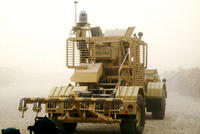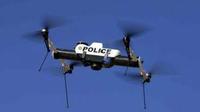-
Downloadable, printable gun technology may change gun-ownership landscape
An Austin, Texas-based Defense Distributed says its mission is to create the WikiWeapon: a downloadable Internet file which will allow users to print their gun on a 3D printer; when the development process is complete, “any person has near-instant access to a firearm through the Internet,” the company says;the company adds: “This project might change the way we think about gun control and consumption. How do governments behave if they must one day operate on the assumption that any and every citizen has near instant access to a firearm through the Internet? Let’s find out”
-
-
Major surveillance law heading toward its own end-of-year cliff

While coverage of the tense negotiations over a resolution to the fiscal cliff threat has dominated the media, the Foreign Intelligence Surveillance Amendments of 2008 is heading for a cliff of its own, as the provisions of the act are set to expire at the end of the year
-
-
Army engineers develop new roadway threat detection system

Explosives along roadways remain an unrelenting hazard for deployed soldiers; U.S. Army engineers have developed a system for detecting possible threats by identifying potential threat locations on unimproved roads; the system can perform region of interest cueing of threats at greater standoff distances, which can be further interrogated by the radar as the vehicle gets closer to the threat
-
-
Maintaining robust communications in congested and contested environments
Radios are used for a wide range of tasks, from the most mundane to the most critical of communications, from garage door openers to military operations’ as the use of wireless technology proliferates, radios and communication devices often compete with, interfere with, and disrupt the operations of other devices; a new DARPA challenge is looking for innovative approaches that ensure robust communications in such congested and contested environments
-
-
In Oklahoma, even rumors of threat of school violence are taken seriously, and investigated
Threats of violence in schools must be taken seriously, even if the threats are nothing more than rumors; in Tulsa, Oklahoma, police and school officials take every threat seriously, even if it is nothing more than gossip
-
-
Seattle debates use of drones by police
The debate between law enforcement and privacy advocates over the use of UAVs is now taking place in Seattle; since President Obama signed a bill in February pushing the Federal Aviation Administration (FAA) to allow the use of civilian drones in America by 2015, many law enforcement agencies have been preparing to use drones
-
-
Budget cuts cause states to lose ground on emergency preparedness
A new report examines the preparedness of states for different emergencies, including plans to evacuate children from schools, vaccination requirements, disease outbreaks, the ability to deal with chemical terrorism, staffing for a prolonged infectious disease outbreak, having a multi-hazard written evacuation plan, Medicaid coverage of flu shots, nurses’ ability to work in other states, and other emergency factors; the report found that only five states met eight of the ten measures used to evaluate public health preparedness
-
-
Is stricter gun-control legislation more likely after Newtown shooting?
An American politics professor, specializing in the relationship between public opinion and legislation, says that the relationship between mass shooting and gun-control legislation is not straightforward;thus, there was a spike in support for gun control after Columbine, but not after the Virginia Tech, Tucson, or Aurora shootings; “The Newtown shooting is different than those shootings in some respects, especially because many of the victims were young children. But the magnitude of this tragedy may not be sufficient to produce stricter gun-control legislation at the federal level”
-
-
What we know, and what we can do, about school shootings
Since the early 1970s, school shootings at American elementary, secondary, and higher education institutions have been a painful reality for American society; after each incident — like the recent attack in Newtown, Connecticut — there is voluminous dialogue about what can be done to prevent the next such tragedy; a new study explores what we have learned about these tragic incidents, and what can be done to prevent them
-
-
New Mexican government to set up a new police force to fight drugs, crime

Mexican president Enrique Pena Nieto has said his government would create a new national police force as part of a new approach to dealing with drugs, crime, and violence; Pena Nieto took office on 1 December; the new, militarized police force would have about 10,000 officers initially, but would eventually grow to 40,000
-
-
Connection between goth subculture, mass shootings appears tenuous

Classmates of the otherwise bland and elusive Adam Lanza, who last Friday killed twenty children and six adults at the Sandy Hook school in Newton, Connecticut, described him as “goth”; is there a “goth” connection in the Newtown school shooting? The question is asked because news reports have connected several perpetrators of both mass shooting and killing on a smaller scale to goth culture; a closer examination shows that the relationship between goth and mass shooting is tenuous
-
-
NRA shuts down Facebook page in wake of Connecticut shooting
In the immediate aftermath of the Newtown shooting, the National Rifle Association (NRA) has deactivated its Facebook page, just one week after celebrating the fact that it has gathered 1.7 million “likes” on the page; the debate about whether the United States needs stricter gun controls continues, though
-
-
U.S. Defense Secretary signs order to deploy anti-missile units in Turkey

Secretary of Defense Leon Panetta on Friday signed an official deployment order to send 400 American military personnel as well as two Patriot air defense units to Turkey as the cross-border tensions between Turkey and Syria have increased
-
-
Privacy advocates succeed in delaying drone purchase by California country sheriff

Congress earlier this year passed legislation earlier this year ordering the Federal Aviation Administration (FAA) to accelerate the approval of the use of unmanned aerial vehicles (UAVs) for law enforcement and other domestic purposes, and, law enforcement agencies around the country are moving to purchase drones; Alameda Country, California planned to buy a drone, but action by the ACLU and the Electronic Frontier Foundation forced the county to hold a public hearing on drone use and formulate guideless for, and set limits on, drone use by police
-
-
Deployable RF data backbone which matches fiber optic capacity
DARPA envisions 100-Gigabit per second RF communications link between airborne and ground assets; the goal is for the data link to achieve a range greater than 200 kilometers between airborne assets and a range greater than 100 kilometers between an airborne asset (at 60,000 feet) and the ground
-
More headlines
The long view
Why Was Pacific Northwest Home to So Many Serial Killers?
Ted Bundy, Gary Ridgway, George Russell, Israel Keyes, and Robert Lee Yates were serial killers who grew up in the Pacific Northwest in the shadow of smelters which spewed plumes of lead, arsenic, and cadmium into the air. As a young man, Charles Manson spent ten years at a nearby prison, where lead has seeped into the soil. The idea of a correlation between early exposure to lead and higher crime rates is not new. Fraser doesn’t explicitly support the lead-crime hypothesis, but in a nimble, haunting narrative, she argues that the connections between an unfettered pollution and violent crime warrant scrutiny.
Bookshelf: Smartphones Shape War in Hyperconnected World
The smartphone is helping to shape the conduct and representation of contemporary war. A new book argues that as an operative device, the smartphone is now “being used as a central weapon of war.”
